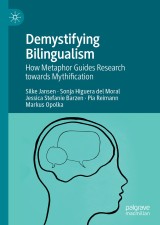Details

Demystifying Bilingualism
How Metaphor Guides Research towards Mythification|
CHF 142.00 |
|
| Verlag: | Palgrave Macmillan |
| Format: | |
| Veröffentl.: | 02.12.2021 |
| ISBN/EAN: | 9783030870638 |
| Sprache: | englisch |
| Anzahl Seiten: | 376 |
Dieses eBook enthält ein Wasserzeichen.
Beschreibungen
<p>This book analyses changing views on bilingualism in Cognitive Psychology and explores their socio-cultural embeddedness. It offers a new, innovative perspective on the debate on possible cognitive (dis)advantages in bilinguals, arguing that it is biased by popular “language myths”, which often manifest themselves in the form of metaphors. Since its beginnings, Cognitive Psychology has consistently modelled the coexistence between languages in the brain using metaphors of struggle, conflict and competition. However, an ideological shift from nationalist and monolingual ideologies to the celebration of bilingualism under multicultural and neoliberal ideologies in the course of the 20<sup>th</sup> century fostered opposing interpretations of language coexistence in the brain and its effects on bilinguals at different moments in time. This book will be of interest to students and scholars of Cognitive Psychology, Psycholinguistics, Multilingualism and Applied Linguistics, Cognitive and Computational Linguistics, and Critical Metaphor Analysis.</p>
Chapter 1: Introduction.<div>Chapter 2: Historical development and state of the art in research on the bilingual advantage.- Chapter 3: Unravelling language myths in academic discourse: Methodological considerations.- Chapter 4: Languages as objects, substances, and containers: The ontological foundations of language myths.</div><div>Chapter 5: National narratives as language myths: The metonymic conflation of languages, speakers and nations.</div><div>Chapter 6: Mind and language between the organic and the anorganic.</div><div>Chapter 7: The survival of the fittest: contention as the leading metaphor in understanding bilingualism.</div><div>Chapter 8: Deconstructing the "bilingual advantage": The fallacies of metaphorical thinking in science.- Chapter 9: Conclusion. </div>
<p><b>Silke Jansen</b> is Professor and Chair of Romance Philology (especially Linguistics) at Friedrich-Alexander Universität Erlangen-Nürnberg, Germany. She specializes in sociolinguistics, language contact, and linguistic ideologies, with a focus on Latin America and the Caribbean. </p>
<p><b>Sonja Higuera del Moral</b> is a PhD student at Friedrich-Alexander Universität Erlangen-Nürnberg, Germany. She is currently working on her PhD thesis on multilingual repertoires and language management skills of Hispanic migrants in Germany.</p>
<p><b>Jessica Stefanie Barzen</b> is a Research Assistant at Mannheim University, Germany. She graduated from Friedrich-Alexander Universität Erlangen-Nürnberg with a Doctor’s degree in linguistics, focusing on language contact and multilingualism. She has engaged in international research, study, and instruction in the US, Cuba, the Dominican Republic, and Haiti.</p>
<p><b>Pia Reimann</b> graduated from Friedrich-Alexander Universität Erlangen-Nürnberg, Germany with a Master's degree in linguistics, focusing on language acquisition and multilingualism. As a visiting scholar at the Pennsylvania State University, USA, she gained further experience by studying experimental psycholinguistic approaches.</p>
<p><b>Markus Opolka</b> is a software developer and system administrator with more than 10 years of professional experience in open-source technology. He has studied Computational Linguistics and Romance Philology at Friedrich-Alexander Universität Erlangen-Nürnberg, Germany.</p>
<p><b>Sonja Higuera del Moral</b> is a PhD student at Friedrich-Alexander Universität Erlangen-Nürnberg, Germany. She is currently working on her PhD thesis on multilingual repertoires and language management skills of Hispanic migrants in Germany.</p>
<p><b>Jessica Stefanie Barzen</b> is a Research Assistant at Mannheim University, Germany. She graduated from Friedrich-Alexander Universität Erlangen-Nürnberg with a Doctor’s degree in linguistics, focusing on language contact and multilingualism. She has engaged in international research, study, and instruction in the US, Cuba, the Dominican Republic, and Haiti.</p>
<p><b>Pia Reimann</b> graduated from Friedrich-Alexander Universität Erlangen-Nürnberg, Germany with a Master's degree in linguistics, focusing on language acquisition and multilingualism. As a visiting scholar at the Pennsylvania State University, USA, she gained further experience by studying experimental psycholinguistic approaches.</p>
<p><b>Markus Opolka</b> is a software developer and system administrator with more than 10 years of professional experience in open-source technology. He has studied Computational Linguistics and Romance Philology at Friedrich-Alexander Universität Erlangen-Nürnberg, Germany.</p>
This book analyses changing views on bilingualism in Cognitive Psychology and explores their socio-cultural embeddedness. It offers a new, innovative perspective on the debate on possible cognitive (dis)advantages in bilinguals, arguing that it is biased by popular “language myths”, which often manifest themselves in the form of metaphors. Since its beginnings, Cognitive Psychology has consistently modelled the coexistence between languages in the brain using metaphors of struggle, conflict and competition. However, an ideological shift from nationalist and monolingual ideologies to the celebration of bilingualism under multicultural and neoliberal ideologies in the course of the 20<sup>th</sup> century fostered opposing interpretations of language coexistence in the brain and its effects on bilinguals at different moments in time. This book will be of interest to students and scholars of Cognitive Psychology, Psycholinguistics, Multilingualism and Applied Linguistics, Cognitive and Computational Linguistics, and Critical Metaphor Analysis.<div><p><b>Silke Jansen</b> is Professor and Chair of Romance Philology (especially Linguistics) at Friedrich-Alexander Universität Erlangen-Nürnberg, Germany. She specializes in sociolinguistics, language contact, and linguistic ideologies, with a focus on Latin America and the Caribbean.</p><p><b>Sonja Higuera del Moral</b> is a PhD student at Friedrich-Alexander Universität Erlangen-Nürnberg, Germany. She is currently working on her PhD thesis on multilingual repertoires and language management skills of Hispanic migrants in Germany.</p><p><b>Jessica Stefanie Barzen</b> is a Research Assistant at Mannheim University, Germany. She graduated from Friedrich-Alexander Universität Erlangen-Nürnberg with a Doctor’s degree in linguistics, focusing on language contact and multilingualism. She has engaged in international research, study, and instruction in the US, Cuba, the Dominican Republic, and Haiti.</p><p><b>Pia Reimann</b> graduated from Friedrich-Alexander Universität Erlangen-Nürnberg, Germany with a Master's degree in linguistics, focusing on language acquisition and multilingualism. As a visiting scholar at the Pennsylvania State University, USA, she gained further experience by studying experimental psycholinguistic approaches.</p><p><b>Markus Opolka</b> is a software developer and system administrator with more than 10 years of professional experience in open-source technology. He has studied Computational Linguistics and Romance Philology at Friedrich-Alexander Universität Erlangen-Nürnberg, Germany.</p></div>
<p>Explores the changing views on bilingualism in Experimental Cognitive Psychology within the last hundred years</p><p>Offers a new, innovative perspective on the ongoing debate of the so-called bilingual advantage</p><p>Combines computer-aided quantitative and qualitative methods under a critical metaphor analysis framework</p>


















